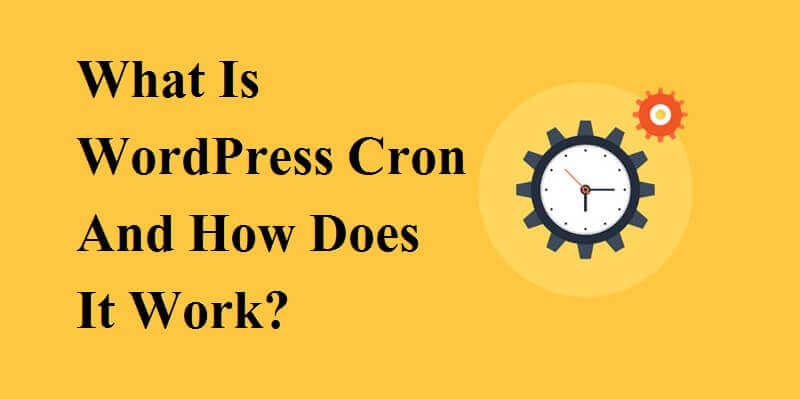If you are a busy website owner, the last thing you want to do is spare time on repetitive, mundane tasks on its maintenance. After all, although necessary for the smooth running of your business, keeping track of all the plugin updates, plan renewals, and scheduled posts can be quite time-consuming. Also, tasks can easily slip through the net. Here is where WordPress cron jobs come into play.
WordPress Cron is a vital part of the functionality of a WP website as it facilitates automated task execution. In essence, it is a system within the web server that streamlines scheduling and automatic completion of operations without the need for manual intervention. This dynamic functionality is quite useful for WordPress website administrators and marketers as it enhances page loading speed and user experience.
At its core, WordPress Cron functions as a pseudo-cron system, relying on the cyclical ebb and flow of user traffic to trigger scheduled events. Unlike traditional cron jobs embedded in operating systems, WordPress Cron is intricately tied to the interactions of visitors. This unique approach ensures that tasks are executed based on real-time user engagement, aligning with the natural rhythm of website usage.
If you own a website but are not a professional, trying to manage WordPress cron on your own can have negative consequences like slowing down your website, especially if you use shared hosting. A WordPress agency would know how to identify issues with scheduled cron events and fix them before they affect your traffic and online performance.
In this article, we will outline the benefits of WordPress Cron and describe its main characteristics. Also, we will walk you through five WordPress cron operations for smooth usage.
System Cron vs WordPress Cron: A Comparative Analysis
In the realm of task scheduling, two prominent methodologies stand out: System Cron and WordPress Cron. Each approach bears its unique characteristics, advantages, and disadvantages, catering to distinct requirements within the vast landscape of web development.
System Cron
System Cron is deeply entrenched in Unix-based operating systems, offering a robust and time-tested solution for automating tasks. It operates on a predetermined schedule, executing tasks at specified intervals defined by the system administrator. This method ensures precision and reliability, making it ideal for scenarios where strict timing is paramount.
Advantages of System Cron
Precision and Reliability. System Cron excels in precision, adhering strictly to predefined schedules. This reliability is critical for tasks requiring accuracy and adherence to specific timeframes.
Autonomy from Website Traffic. Since System Cron operates independently of website activity, it remains unaffected by fluctuations in user visits. This autonomy makes it suitable for tasks that demand consistency irrespective of user interactions.
Disadvantages of System Cron
Rigid Timing. The fixed schedule of System Cron may be a limitation in scenarios where task execution needs to adapt dynamically to varying conditions or user behavior.
Server Load Impact. Scheduled tasks may coincide, causing spikes in server load during execution periods. Managing this load requires careful planning and resource allocation.
WordPress Cron
In contrast, WordPress Cron is a pseudo-cron system deeply integrated into the WordPress ecosystem. Unlike its system counterpart, it relies on website traffic to trigger scheduled events. This approach aligns task execution with real-time user interactions, presenting a more dynamic and user-centric scheduling mechanism.
Advantages of WordPress Cron
Dynamic Task Scheduling. WordPress Cron adapts to the website’s traffic patterns, ensuring tasks align with user engagement. This dynamic approach is particularly beneficial for events tied to user interactions, such as publishing scheduled posts or sending notifications.
Reduced Server Load. By linking task execution to user visits, WordPress Cron minimizes server load during periods of low activity. This contributes to a more efficient utilization of resources and a smoother user experience.
Disadvantages of WordPress Cron
Dependency on User Traffic. WordPress Cron’s reliance on user interactions can lead to delays in task execution during periods of low traffic. This dependency may pose challenges for websites with sporadic user engagement.
Less Precision in Timing. The dynamic nature of WordPress Cron may result in less precise timing compared to System Cron, making it less suitable for tasks requiring strict adherence to specific schedules.
8 Things To Know About WordPress Cron: Navigating the Dynamic World of Task Automation
WordPress Cron stands as a dynamic force within the WordPress ecosystem, orchestrating the automated execution of tasks. Here are 8 key facts that unravel the intricacies of WordPress Cron, shedding light on its functions, benefits, common challenges, and troubleshooting methods. Understanding these nuances is paramount for developers and site administrators seeking to harness the full potential of this pseudo-cron system.
1. Dynamic Event Triggering
At the core of WordPress Cron’s functionality is its dynamic event-triggering mechanism. Unlike traditional cron jobs tied to fixed schedules, WordPress Cron relies on user traffic to activate scheduled tasks. This dynamic approach ensures that tasks align with the real-time engagement patterns of website visitors, offering a flexible and user-centric automation solution.
2. Benefits of WordPress Cron
WordPress Cron brings several advantages to the table. Its user-centric triggering mechanism ensures that scheduled tasks occur during periods of actual website activity. This not only optimizes server resources but also contributes to a smoother user experience by preventing unnecessary server strain during low-traffic intervals. The dynamic nature of WordPress Cron makes it particularly well-suited for tasks tied to user interactions, such as publishing scheduled content or sending notifications.
3. Common Issues with WordPress Cron
Despite its dynamic functionality, WordPress Cron is not without its challenges. One common issue stems from its dependence on user traffic. During periods of low activity, scheduled tasks may experience delays or fail to execute. Understanding this inherent dependency is crucial for developers and administrators to manage expectations and troubleshoot effectively.
4. Troubleshooting Tips for WordPress Cron
To address issues with WordPress Cron, developers, and administrators can employ various troubleshooting techniques. One effective tool is the WP Crontrol plugin, which provides insights into scheduled tasks, their status, and last execution times. Additionally, utilizing the wp cron event list command in the terminal allows for a detailed overview of scheduled events, aiding in the identification of potential bottlenecks or delays.
5. Importance for Developers
Developers play a pivotal role in optimizing WordPress Cron for enhanced performance. Understanding its inner workings enables developers to fine-tune task scheduling, ensuring efficient use of resources and minimizing potential issues. Knowledge of how to add, modify, or disable cron jobs programmatically using functions like wp_schedule_event or wp_unschedule_event empowers developers to customize task automation based on the specific needs of the website.
6. Importance for Site Administrators
Site administrators also benefit significantly from a deep understanding of WordPress Cron. Managing scheduled tasks, especially in scenarios where timely execution is crucial, becomes more effective when administrators can navigate the scheduled events list using tools like WP Crontrol. Awareness of potential delays during low-traffic periods allows administrators to plan accordingly and communicate realistic expectations to stakeholders.
7. Flexibility in Task Scheduling
WordPress Cron offers flexibility in task scheduling, allowing developers to define the frequency and timing of events based on their unique requirements. This adaptability is particularly valuable for websites with varying user engagement patterns, ensuring that automated tasks align with the ebb and flow of user interactions.
8. Preventing Overlapping Tasks
Developers can use caution to prevent overlapping tasks, which may lead to spikes in server load. By carefully scheduling tasks and utilizing functions like wp_reschedule_event to adjust timing, developers can ensure a smoother distribution of server resources, avoiding potential performance bottlenecks.
How to Manage WordPress Cron Jobs: A Comprehensive Guide
Effectively managing WordPress Cron jobs is paramount for ensuring the seamless execution of automated tasks on your website. Whether you are a developer fine-tuning scheduled events or a site administrator overseeing crucial processes, this step-by-step guide will help you navigate the intricacies of WP Cron job management.
Viewing Scheduled Tasks
To gain insights into your scheduled tasks, you can use the WP Crontrol plugin, a powerful tool for managing WordPress Cron jobs. Follow these steps:
Navigate to your WordPress admin dashboard.
Select “Plugins” from the menu and click on “Add New.”
Search for “WP Crontrol” and install the plugin.
After activation, find the “Cron Events” menu in the admin sidebar. Here, you’ll see a comprehensive list of your scheduled tasks, their schedules, and other relevant details.
Alternatively, you can use the wp cron event list command in the terminal for a detailed overview of scheduled events and their status.
Adding New Tasks
Developers often need to add new tasks to automate specific processes. Here’s how you can add new WordPress Cron jobs programmatically:
Open your theme’s functions.php file or create a custom plugin file.
Use the wp_schedule_event function to define the hook, frequency, and callback function for your new task. For example:
PHP
wp_schedule_event( time(), ‘daily’, ‘my_custom_event_hook’ );
Ensure the associated function (my_custom_event_function in this case) is defined and contains the code you want to execute.
Save the file, and WordPress will now execute your custom task based on the specified schedule.
Modifying Existing Tasks
To modify the schedule of an existing task, you can use the wp_reschedule_event function. Follow these steps:
Open your theme’s functions.php file or custom plugin file.
Locate the existing scheduled event you want to modify.
Use the wp_reschedule_event function to update the schedule. For example:
PHP
wp_reschedule_event( $timestamp, ‘weekly’, ‘my_custom_event_hook’ );
Save the file, and WordPress will adjust the schedule of the specified task accordingly.
Disabling Cron Jobs
Temporarily disabling cron jobs can be useful when troubleshooting or making adjustments. Here’s how you can disable a specific cron job:
Open your theme’s functions.php file or custom plugin file.
Locate the scheduled event you want to disable.
Use the wp_unschedule_event function to remove the scheduled event. For example:
PHP
wp_unschedule_event( $timestamp, ‘my_custom_event_hook’ );
Save the file, and the specified task will no longer be scheduled.
Advanced Management with WP CLI
For those comfortable with the command line, the WP CLI tool offers additional functionalities for managing WordPress Cron jobs:
To view a list of scheduled events, use the command:
bash
wp cron event list
To unschedule a specific event, use:
bash
wp cron event unschedule my_custom_event_hook
These commands provide a streamlined way to manage cron jobs directly from the terminal.
Conclusion
In essence, WordPress Cron emerges as a pivotal component, orchestrating automated tasks with finesse. Its dynamic, user-centric approach sets it apart, aligning task execution with real-time website engagement. Developers and administrators, armed with insights into its nuances, can harness its potential for optimized performance. Whether viewing, adding, modifying, or disabling cron jobs, mastering WP Cron management ensures a responsive, efficient, and seamlessly automated WordPress ecosystem.
Author bio – Mariela Kashukeeva is an Outreach & Content Specialist at DevriX. With over 6-year experience in SEO, she is responsible for establishing collaboration opportunities with high-authority websites and creating amazing content.



